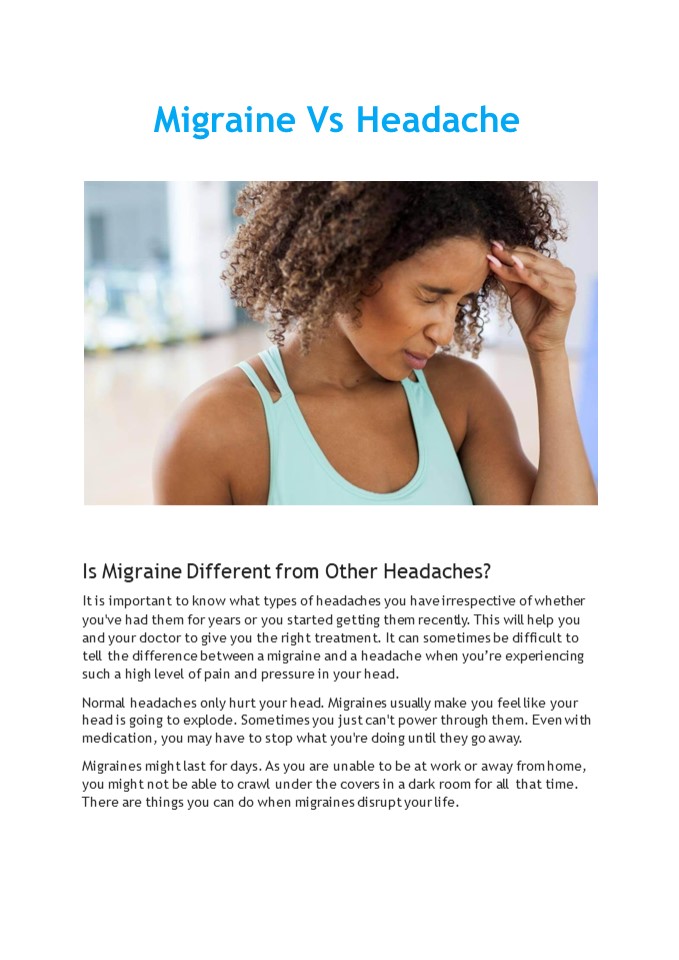Difference Between Migraine and Headaches - PowerPoint PPT Presentation
Title:
Difference Between Migraine and Headaches
Description:
Are you suffering from headaches and do not know what they are? Headache is a term used to describe a pain in the head, while migraine is a more specific term for a type of headache. Here, you will find out the difference between a headache and migraine and learn the symptoms to identify them. – PowerPoint PPT presentation
Number of Views:5
Title: Difference Between Migraine and Headaches
1
Migraine Vs Headache
Is Migraine Different from Other Headaches? It is
important to know what types of headaches you
have irrespective of whether you've had them for
years or you started getting them recently. This
will help you and your doctor to give you the
right treatment. It can sometimes be difficult to
tell the difference between a migraine and a
headache when youre experiencing such a high
level of pain and pressure in your head. Normal
headaches only hurt your head. Migraines usually
make you feel like your head is going to explode.
Sometimes you just can't power through them. Even
with medication, you may have to stop what
you're doing until they go away. Migraines might
last for days. As you are unable to be at work or
away from home, you might not be able to crawl
under the covers in a dark room for all that
time. There are things you can do when migraines
disrupt your life.
2
- What is Headache?
- There is a wide range of kinds of headaches,
which specialists have characterized into two
principal gatherings primary and secondary. - Primary headaches allude to autonomous
circumstances that cause pain in the head, face,
or neck. Instances of primary headaches
incorporate headaches and pressure headaches. - Secondary headaches happen as the aftereffect of
another ailment, like an infection, stress, or
medicine abuse. - Other types of headaches include
- Cluster Headache Cluster headaches a subtype
of a migraine are seriously painful headaches
that happen on one side of the head and come in
clusters. This implies you experience patterns of
headache - assaults, trailed by sans headache periods. They
are most normally experienced behind or over the
eye or at the sanctuary. - Sinus Headache Often confused with migraine,
sinus headaches co-occur with sinus infection
symptoms like fever, stuffy nose, cough,
congestion, and facial pressure.
3
- Brain Structure Headache Wounds and ailments can
likewise prompt headaches. A Chiari headache is
brought about by an inherent Chiari - mutation. This very rare condition makes the
skull push against parts of the mind, frequently
causing pain toward the rear of the head.
Increased intracranial pressure is a
life-threatening clinical issue that can likewise
prompt heads. It tends to be brought about by
conditions, like - an aneurysm
- arteriovenous malformation
- brain tumor
- meningitis
- encephalitis
- Thunderclap headaches A "thunderclap" headache
is an exceptionally extreme headache that
creates in 60 seconds or less. It very well may
be a side effect of a subarachnoid drain, a
serious ailment that requires - prompt clinical consideration. It might likewise
be brought about by an aneurysm, stroke, or
another injury.
4
What is Migraine? Since migraines emerge because
of no other sickness or injury, they're viewed as
primary headache problems. Migraine assaults
produce a more extensive scope of symptoms than
headaches, and they last somewhere in the range
of four hours to a few days. Migraines progress
through a progression of stages. At the point
when they're all out, they are frequently joined
by sickness vomiting sensitivity to light,
sound, and certain smells and muscle weakness.
- Migraine Triggers
- Migraines are associated with their triggers,
which are foods, stimuli, or other conditions
that can bring on an attack. These vary from
person to person and can include - Stress or anxiety
- Changes in sleeping patterns
- Bright, flashing, or fluorescent lights, as well
as the glow of screens - Certain foods, including dark chocolate, cured
meats, aged cheeses, or pickled or fermented
items - Some beverages, especially red wine or other
alcohol, and coffee or tea in others - Hormonal changes, such as menopause or
menstruation - Overuse of pain medications
Continue to Read In Details Click Here































